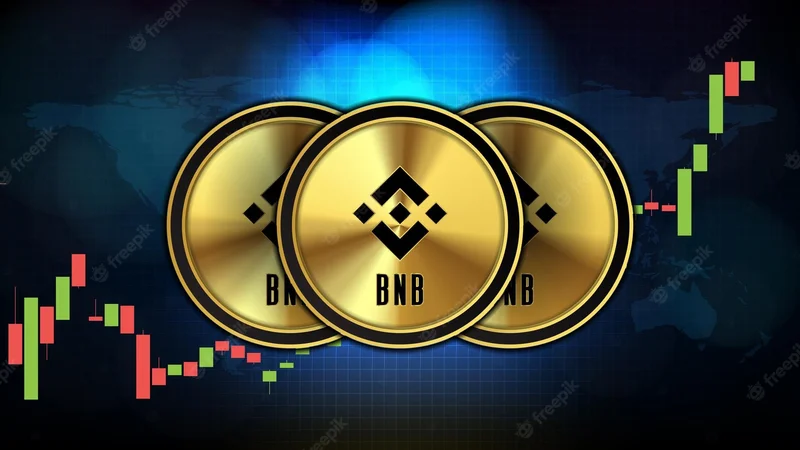I've been watching the markets for a long time, and every so often, a signal cuts through the noise—a moment that isn't just about numbers on a screen, but about a fundamental shift in how we think about technology and value. The recent surge of the BNB coin isn't just another crypto rally. We're witnessing the economic awakening of a digital nation-state, and its currency just hit an all-time high of over $1,300.
When I saw the chart showing BNB flips XRP as the third-largest crypto asset by market cap, I honestly just had to step away from my desk for a minute. This isn't merely a financial event; it's a profound statement about where the industry's energy, capital, and—most importantly—belief are flowing. An 80% price increase in three months doesn't just happen because of speculation. It happens when an entire ecosystem reaches critical mass. What we're seeing with the BNB Chain is the digital equivalent of a city that's suddenly booming—the streets are packed, new businesses are opening on every corner, and the value of being a citizen there is skyrocketing.
This isn't just hype. The data tells a story of incredible, foundational growth. The average number of transactions on the BNB Chain has quadrupled since the first quarter, new tokens are launching constantly on its decentralized exchanges, and the whole ecosystem is buzzing with an energy that feels less like a market and more like a Cambrian explosion of digital creation—it’s a clear sign that we’ve moved past simple speculation into the realm of genuine, widespread utility. This is the kind of breakthrough that reminds me why I got into this field in the first place.
So, what’s actually driving this? It's easy to point to the broader market rally, with Bitcoin cresting $126,000 amid political uncertainty. But that's only part of the picture. The real story here is about a brilliantly designed, vertically integrated system. Binance, with its massive global user base and easy fiat on-ramps, acts as the grand gateway, funneling millions of people directly into the BNB Chain. Features like Binance Alpha are essentially a superhighway for discovery, making it almost frictionless for users to explore and participate in new applications.
Think of it like the great railroad companies of the 19th century. They didn't just build the tracks; they owned the trains, influenced the development of the towns along the routes, and effectively created their own economies. Binance has built the digital equivalent.

And at the heart of this economy is a fascinating economic principle: a deflationary burn mechanism. This is partly driven by its token burn program—in simpler terms, think of it like a national treasury conducting a massive stock buyback. A portion of the currency generated from transaction fees is permanently removed from circulation, making the remaining tokens scarcer and, theoretically, more valuable over time. The more active the economy, the faster the currency tightens. It’s a self-reinforcing loop of value creation. Is it any wonder that PancakeSwap, the chain's flagship decentralized exchange, saw its highest volume since 2021? It’s not an outlier; it’s a symptom of a thriving digital metropolis.
Of course, this meteoric rise hasn't come without controversy. When you look at social media, you see whispers of "price manipulation" and uneasy comparisons to failed projects of the past. Some commentators, particularly in communities like Solana's, look at BNB's utility and question if the valuation is organic. One popular comment even likened it to the FTX token, waiting for a "glorious" unraveling.
But to dismiss this as mere manipulation is, I think, to miss the bigger picture. We aren't looking at a purely decentralized, grassroots project, nor are we looking at a traditional corporate stock. We're witnessing the birth of a new hybrid model, a "centralized-decentralized" ecosystem, and it comes with a unique set of challenges and questions.
Look no further than the founder, Changpeng "CZ" Zhao, himself. Amidst this incredible rally, he made headlines by admitting he prefers using X (formerly Twitter) over Binance's own social platform, Binance Square. Critics immediately jumped on it, questioning why a founder wouldn't be the biggest champion of his own ecosystem. But I see something different. I see a leader grappling with the complex duality of his role. He uses X to reach the "non-Binance community," acknowledging that the broader conversation happens on neutral ground. His security concerns about staying logged out of his own exchange speak to the immense responsibility on his shoulders.
This is the central tension of the new digital nation-state. Can a single entity and its founder act as benevolent stewards for a global, decentralized economy? With reports suggesting CZ may personally hold a vast percentage of the BNB supply, the question of governance becomes paramount. This isn't a flaw in the system; it is the system—an audacious experiment in balancing centralized efficiency with the decentralized ethos of crypto. And like any bold experiment, it carries both incredible promise and inherent risks that we must watch with open eyes.
What we are witnessing with BNB is more than just a token rally; it's a blueprint. It’s a case study in how to build a digital economy from the ground up, complete with its own currency, its own infrastructure, and its own unique form of governance. The price of BNB is simply the world's real-time vote of confidence in that blueprint. The questions of centralization and trust are real and important, but they don't negate the monumental achievement here. An entire, self-sustaining digital world is coming to life before our very eyes, and it's just getting started. Imagine what happens next.